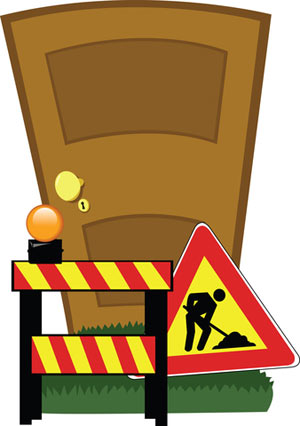Know Your Limits
 It’s important to first understand your limits. What I mean by this is really two fold.
It’s important to first understand your limits. What I mean by this is really two fold.
First thing I would like to talk about is your physical limits. By this I am talking about the limits your mind can cope with most optimally before it starts to impact the decisions that you make. Of course relating this to Poker I am talking about how many poker tournaments to play at once.
The second thing I would like to talk about is finances and more specifically the limits caused by our finances. In Poker we call this bankroll management.
One table or multi-table ?
When you play Live Poker in a casino it stands to reason you can only play one tournament at a time, you might look a little odd trying to play in two tournaments and running frantically between tables trying to play each hand!
With Online Poker it is different, it is very simple to play multiple tournaments all at the same time, by having more than one table view on your computer screen, you can even have multiple monitors set up to see even more tables.
It just amazes me when I hear stories of players playing up to 8 tables or more online at one time and having any degree of success. I know that some do, Tom Dwan and other poker professionals come to mind.
I think it’s incredible that anyone can do that. There is no way that you can play optimally on all those tables all at the same time, there will just be too many clashes for your brain power and so much pressure to make quick decisions. Never mind the fact that you cannot study your opponents effectively which can be such a big part of playing good poker.
I once entered what I thought was a 9 player sit & go tournament. Well it was a 9 player sit & go but I missed the ‘m’ beside the entry and was now involved in what this particular poker site called a matrix tournament. You play the same players on 4 tables at once.
On the one hand I kind of liked the action because you are involved in more hands and have to make more decisions a little quicker as you may have to act on 2 tables at once. It also gives you more chances to cash and win some money.
For me though, there was more to dislike. I try to use every advantage I can to cash in a tournament. That means making notes on players when I see a trend or tell and reading the notes I’ve already made. To me this takes time and time is something you do not have when you are multi-tabling.
I also think the early stage of any tournament is ‘information gathering time’. You can start to get a feel for the game at hand as well as the type of players at the table. Every hand played factors into your decisions in the upcoming hands. It’s like a snowball that starts as a flake and builds from there. Each decision you make in a tournament should be more of an informed one than the previous.
If you are playing many tables at once you might not pick up on the fact that a certain player LOVES to make continuation bets. A player that plays one table might pick up on that and be able to take advantage of that by putting in a check/raise knowing the opponent will fold, thereby scooping a pot. The multi-tabler (is that a word?) might just fold and move on to the next hand.
I believe that gathering information on players and using the notes function available on every site (as far as I know), is a valuable tool in helping you to win/cash. To do this you need to be able to concentrate on the game at hand and to do that you cannot be switching from table to table.
So my advice is stick to a single tournament and don’t be tempted to multi table. Again this is something you can add in at a later stage, or play from time to time for a bit of “action” but dedicate your brain to the task in hand of winning a single tournament and I will guarantee that you will make better and more informed decisions and when that happens the opportunities to win start to present themselves.
Personal finances and your bankroll
If there is one thing I really want my daughter to learn as she grows older is the value of money. How hard it is to earn, how easy it is to lose !
I don’t believe in just giving her money. I believe in her earning it. About a year ago we started to provide her with a weekly allowance. For her allowance she would have to do 2 things, clean the cat litter (we have 2 cats) and keep her room tidy. Over time we can increase her allowance but we also increase her chores around the house. After all, I don’t want her thinking she’s living in a hotel!
If there is one area that our school system is lacking it is some sort of basic financial training. I always thought they should teach financial basics such as what a credit card is and how it operates, basic interest rates and how they work, the different types of bank accounts and loans there are … you get the picture. Just the basics so kids can start to gain a healthy appreciation for the true value of money.
The same can be said for learning bankroll management in poker, a lot of players really just don’t understand it and they really would benefit from being taught more about it.
In poker you have to play within your means.
You don’t want to be constantly having to put money into your account. The poker sites would love that but for us players, we want to be making withdrawals right?
I’m not going to go into the specifics of bankroll management because there is already a great article on this site that explains it better than I ever could so make sure you have taken a look at the Introduction to Bankroll Management.
The basic concept of Bankroll management in poker is that you should have seperate funds allocated as your poker bankroll. These funds should be money you can afford to lose and wouldn’t have a serious impact on your personal life if things were to go wrong.
Once you know what the size of this pot of money is (your bankroll) then you can apply correct bankroll management by only risking a small percentage of your bankroll any one time that you play.
For poker Tournaments it is generally considered to hold anywhere between 40 to 100 buyins in your bankroll depending on the level of risk you are prepared to take. If you are a recreational player, who would be able to reload if the worst happened and you lost all your bankroll then 40 buyins would be a good number to hold, however a professional player whose bankroll is his livelihood would probably want more protection against a bad run and hold 100 buyins.
So if you use 40 buyins and had a total bankroll of $80, then you should be playing in tournaments no higher than a $2 buy in. This means that you have the protection of having to play in 40 tournaments and not cash in any of them in order to lose your entire bankroll.
Like I said if your happy with a higher risk and able to reload then you can reduce that number further, but good bankroll management is a key skill to learn and practise. You can move up the buyins as your bankroll grows.
If you find yourself having to reload stop right there. Figure out why you are reloading. I know I know you are reloading because there is no money in your account, ha ha. Your question should be how did it get that way ? What happened to cause you to lose ALL your money ? Analyse your game and look at your bankroll at different points before you had none. Were you dropping down in buy in’s when you were losing ?
For each person it is different but you must be disciplined enough to set your own financial policy … and follow it! That is, when your bankroll falls below a certain level you must drop down a level or 2 in the amount you can afford for tournament buy in’s.
Learning how to manage your personal finances can be a challenge. Managing your poker bankroll can be a challenge. If you have the discipline to learn both and keep to your plan you will most certainly realise the fruits of your labour !
Next in Series:
Section Navigation

Trust & Security
I'll only recommend Safe & Trusted sites with a proven track record
By Game Type
Different rooms are better for different game types & stakes
Beginner Friendly
I'll find you a site with players of a similar skill level
Promotions
I'll find you the best value Promotions, Bonus & Freebies!

 Return to the
Return to the 
